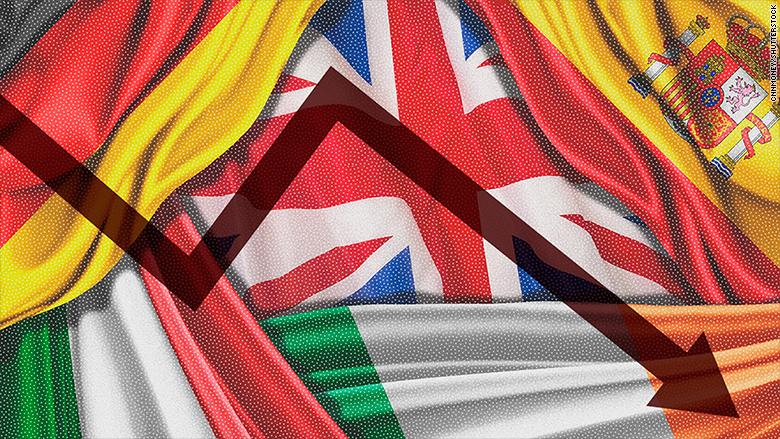
Many of Europe's top banks have lost half their value in a year, and the stock market rout continues.
The institutions nursing some of the biggest losses are large banks like Deutsche Bank (DB), Barclays (BCS), Credit Suisse (CS) and Allied Irish Banks (AIBSF), all of which play a vital role in the economy.
In fact, only one European bank stock is up this year, and you've probably never heard of it: Hungary's OTP Bank.
So what's gone wrong? Here's the gist of it:
Stressed about the stress tests
The sell-off accelerated this week after "stress tests" on 51 of Europe's biggest banks. Regulators wanted to know whether the banks could cope in the event of another deep economic shock.
The results were generally better than expected but not good enough to erase fears that some would fail in a crisis.
"The banks are poorly capitalized," said Diane Pierret, a finance professor at the University of Lausanne's business school. "They still have bad assets on their balance sheets, like bad loans ... and the risk of contagion from the banks of one country to another country is also high."
Related: The world's riskiest bank is in trouble
Pierret and fellow academics say 29 of the 51 banks would fail an American-style stress test, and they need to raise 123 billion euros ($138 billion) in capital to shore up their finances.
Italian banks fared particularly badly. Analysts at Barclays said stability in the Italian sector would remain "brittle" despite news Friday of a private sector rescue package for Banca Monte dei Paschi di Siena (BMDPF). Details of the bailout have led to heightened concerns about rival UniCredit's (UNCFF) financial health.
Negative rates and economic woes
Germany's Commerzbank (CRZBY) warned Tuesday that negative interest rates and "adverse markets" will hurt earnings.
Its share hit a record low. But it's not alone in feeling the pain of extreme measures by central banks.
Negative interest rates, which are set by central banks like the European Central Bank, charge banks for holding onto cash. The aim is to get them to lend money to businesses and individuals to get the economy moving.
But they're not getting great returns when they loan out the money.
"You have low interest rates and a slow economy, which mean they're not lending enough ... and they can't make money on their loans," noted Pierret.
Brexit in the background
On top of all this, the U.K. vote to leave the European Union in the next few years has created additional risks.
Shares in U.K. and European banks came crashing down in the aftermath of the Brexit vote on June 23. Many have yet to recover their losses.
London is the financial center of Europe. Any change to trading and financial relationships between the U.K. and Europe would have big repercussions for banks operating in the region.
Businesses have been urging Britain to move fast with its Brexit plan to keep uncertainty to a minimum. But the process is expected to take years.
Biggest losers
Here is a list of some of the worst performing big banks over the past year:
Barclays: Down 49%
Commerzbank: Down 55%
Credit Suisse: Down 60%
Deutsche Bank: Down 65%
Unione di Banche Italiane: Down 67%
UniCredit: Down 69%
Allied Irish Banks: Down 70%
Banco Popular Espanol: Down 71%
Banca Monte dei Paschi di Siena: Down 85%


